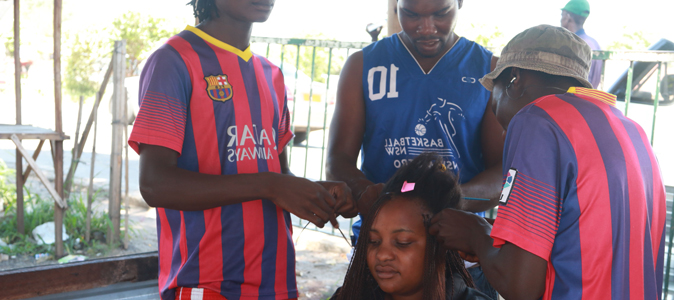
It’s 8am on a Monday and about 12 men gather around in groups in a makeshift hair salon.
BY SILENCE CHARUMBIRA
Striking is their regalia — Spanish football giants Barcelona jerseys — while a vinyl banner matches their attire.

On closer inspection, the men are all plaiting clients hair in their salon at Masimbi in Glen Norah C, a trade previously reserved for females.
The hairdressers have become so popular in the southern suburbs that they are booked from dawn till dusk.
Cleopatra Mahachi, a client says she was referred by a friend and she fell in love with the salon.
“This is my first time here. I am sure I will always come back because they do not take long like other salons where you have one hairdresser who sometimes leaves you,” Mahachi said.
- Chamisa under fire over US$120K donation
- Mavhunga puts DeMbare into Chibuku quarterfinals
- Pension funds bet on Cabora Bassa oilfields
- Councils defy govt fire tender directive
Keep Reading
Donald Bero, one of the male hairdressers said they started as a group of unemployed youths earning a few dollars until they made enough money to provide for their families.
“We make around $200 per day, especially during peak periods like back to school days and festive holidays,” said Bero.
“Our families now know that we will be at work unlike in the beginning when we would just be doing it for leisure.”
Their charges of between $10 and $20 are affordable compared to other salons that charge anything above $20.
Having started in 2010, the Barca team has 14 members. They are rivalled by a group calling itself DeMbare, after Harare football giants Dynamos.
When they started in 2010, none of them was skilled and now they just use experience without any formal training.
It has actually become trendy to have male hairdressers with most women reportedly preferring to have their hair plaited by males.
A South Africa-based Zimbabwean radio personality who preferred to be called DJ Cup Cake said most women preferred male hair dressers due to petty behaviours, gossiping and attitudes and she has Asian male hair dressers to evade the vices.
She said female hairdressers spoke in coded language, gossiping about their clients and ridiculing them using Shona.
“You hear them saying things like, “dzerwendo” in reference to your shoes, gibhe in reference to your handbag. When you hear them shouting “netsai” it would be a code that the client is troublesome or “sarudzai” for someone who takes long to choose a hair style,” she said.
Roselyne Mehlomakulu also based in South Africa said: “It all depends on how he does your hair, but men are relatively gentle unlike some women who are reckless.”
Harare business woman Cynthia Bizure Sithole said men tended to rule the field despite making up a small percentage.
She said men had more enthusiastic clients and were likely to talk “business and less likely to have a ditzy and fluff conversation that makes some feel awkward”.
“Even with personality you will find that women are more likely to dislike a woman with different attitudes and opinions than a man with different attitudes and opinions. Besides, [women] trust that a man will know how to make them attractive to men,” she said.
She said whenever she stepped into a hair salon she expected more hair talk, less girl talk and said having a female stylist was complex.
“For example, you get into a salon and they want to talk about everyone; who is dating who, who is sick, who just caught Aids, who is broke, who is reacting from ARVs, gosh! I hate it. I just want my hair done by someone who concentrates more on why my hairline is receding and which chemical is better, or what the latest weave costs so that I keep with the times,” she said.











